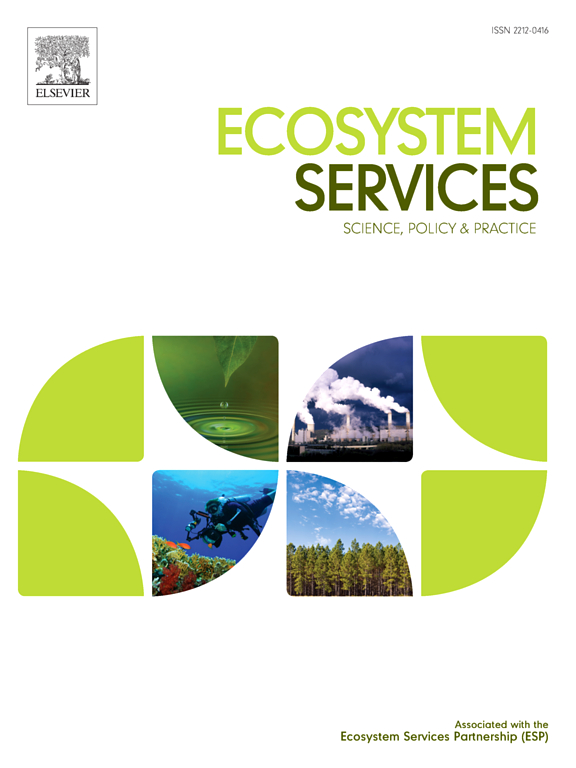Trade-offs in ecosystem services under various river management strategies of the Rhine Branches
IF 6.6
2区 环境科学与生态学
Q1 ECOLOGY
引用次数: 0
Abstract
To make river basins more climate resilient, provide a better living environment for people and other organisms, the EU encourages integrated river and floodplain management (RFM) and calls for restoration of 25,000 km of EU rivers to a free-flowing state in the EU Nature Restoration Law. To support decision making in this domain, there is a need for a holistic assessment framework. However, most policy appraisal studies in river management to date have a limited scope and focus on impacts of measures in a single domain, such as flood risk reduction or water quality. In this study we address this gap by using quantitative models to analyse the supply of 13 ecosystem services under various RFM strategies for the Rhine Branches in the Netherlands. We use a mix of biophysical and monetary indicators to quantitatively assess ecosystem services and the trade-offs involved in different RFM strategies. The results show that strongly regulated, mono-functional RFM has overall lower ES supply than more integrated, multifunctional RFM strategies with rehabilitated floodplains. The latter generally increase ES supply across all domains (provisioning, regulating, cultural), with the exception of crop and fodder production in the floodplains. Overall, our results can inform formulation and communication on RFM strategies in the Netherlands and elsewhere. Also, our approach serves as a demonstration of how the ES framework can be used to support quantitative impact assessment in this domain.
莱茵河支流不同河流管理策略下生态系统服务的权衡
为了使河流流域更具气候适应性,为人类和其他生物提供更好的生存环境,欧盟鼓励河流和洪泛平原综合管理(RFM),并在《欧盟自然恢复法》中呼吁将2.5万公里的欧盟河流恢复到自由流动状态。为了支持这个领域的决策制定,需要一个全面的评估框架。然而,迄今为止,大多数河流管理政策评估研究的范围有限,并且侧重于单一领域措施的影响,例如减少洪水风险或水质。在本研究中,我们通过使用定量模型来分析荷兰莱茵河支流在不同RFM策略下的13种生态系统服务的供应,从而解决了这一差距。我们使用生物物理和货币指标的组合来定量评估生态系统服务和不同RFM策略所涉及的权衡。结果表明,受强烈调控的单一功能RFM总体上的ES供应低于具有恢复洪泛平原的综合多功能RFM策略。后者通常会增加所有领域(供应、调节、文化)的ES供应,但洪泛区的作物和饲料生产除外。总的来说,我们的结果可以为荷兰和其他地方的可再生资源管理战略的制定和沟通提供信息。此外,我们的方法还演示了如何使用ES框架来支持该领域的定量影响评估。
本文章由计算机程序翻译,如有差异,请以英文原文为准。
求助全文
约1分钟内获得全文
求助全文
来源期刊

Ecosystem Services
ECOLOGYENVIRONMENTAL SCIENCES&-ENVIRONMENTAL SCIENCES
CiteScore
14.90
自引率
7.90%
发文量
109
期刊介绍:
Ecosystem Services is an international, interdisciplinary journal that is associated with the Ecosystem Services Partnership (ESP). The journal is dedicated to exploring the science, policy, and practice related to ecosystem services, which are the various ways in which ecosystems contribute to human well-being, both directly and indirectly.
Ecosystem Services contributes to the broader goal of ensuring that the benefits of ecosystems are recognized, valued, and sustainably managed for the well-being of current and future generations. The journal serves as a platform for scholars, practitioners, policymakers, and other stakeholders to share their findings and insights, fostering collaboration and innovation in the field of ecosystem services.
 求助内容:
求助内容: 应助结果提醒方式:
应助结果提醒方式:


